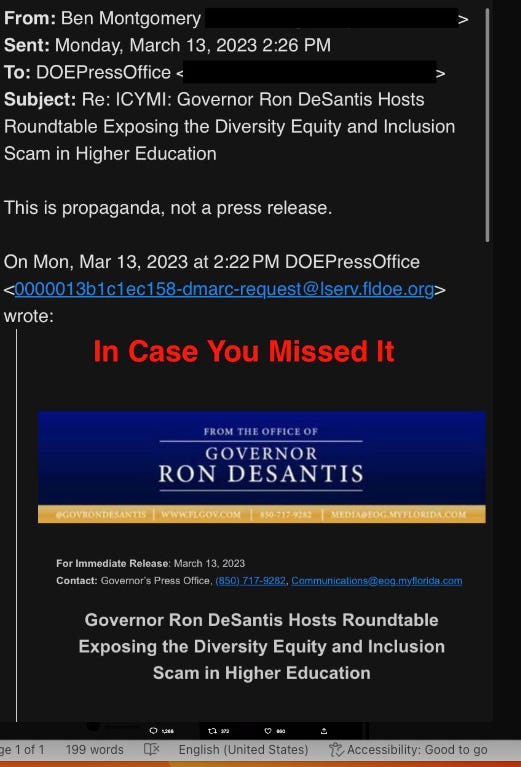That Awful Power
Firing a reporter on almost the exact twentieth anniversary of the U.S. invasion of Iraq has more than a touch of irony. Ben Montgomery, a Tampa correspondent for Axios, was canned for his honesty regarding a document the governor of Florida’s office called a “news release,” which it was not.

“If you don’t want to work, become a reporter. That awful power, the public opinion of a nation, is created in America by a horde of ignorant, self-complacent simpletons who failed at ditch digging and shoemaking and fetched up in journalism on their way to the poorhouse.” - Mark Twain, Connecticut Evening Dinner Club, ca. 1888

In the 2023 version of America, it is hard to tell whether the media or politicians have more power. They both can seemingly distort and destroy almost capriciously. The alternate realities offered up in our post-truth culture provide choices in which to believe. The public tends to pick those that give them comfort and reinforces their traditionally held beliefs even as their decisions ruin careers and distort the facts needed to keep a democracy functional.
And there are new victims every damn day.
The firing of a reporter on almost the exact twentieth anniversary of the U.S. invasion of Iraq has more than a touch of irony. Ben Montgomery, a Tampa correspondent for Axios, was canned for his honesty regarding a document the governor of Florida’s office called a “news release,” which it was not. The reporter was doing precisely what his job demanded by making discerning editorial judgments on information provided from various sources. His assessment, which was widely dispersed on social media, angered Ron DeSantis’ staffers, and the management at Axios overreacted by releasing Montgomery.
What in the hell were they thinking?
Most everything that comes out of DeSantis’ mouth is propaganda. How is a journalist supposed to inform the public properly if they are forced to treat blatant untruths as something less harmful than a lie? The radical Florida governor achieved another victory in his attempt to ignore, intimidate, and chasten media covering his administration and his rising campaign for president. The impact of Montgomery’s firing will cause every editor with reporters on the DeSantis beat to exercise too much caution and restraint while reporting on an extremist who is making a run at undermining basic American liberties.

Montgomery, presumably like most reporters in Florida, received the news release from the governor’s media relations team. The headline indicated there was a “diversity, equity, and inclusion” scam underway in Florida’s higher education system. DeSantis was playing tough guy by insisting “Florida won’t back down from the woke mob,” a group that has yet to be photographed and is as evasive in the wild as the duckbill platypus. The “news” also included a quote from one of the governor’s newly appointed sycophantic college board members.
“I would say the first thing to understand about DEI is that what it’s become in practice is a vehicle for left wing political activists to hijack public resources and turn universities away from the pursuit of knowledge toward the pursuit of their own private political interests,” said Christopher Rufo, New College of Florida Board of Trustees.
That’s not just propaganda. It’s rank bullshit. Diversity, equity, and inclusion have made it possible for millions of Americans, disadvantaged by race, economics, gender, and even sexual orientation, to get an education and bring new ideas and perspectives to university communities across the country. By the DeSantis standards, the Civil Rights protestors and Suffragette demonstrators for the right of women to vote were all members of an historic “woke” mob. The inclusion and fair treatment of historically marginalized demographics and groups of people has fundamentally changed America into a better nation, which was, in saner minds, seen as striving to create a more perfect union.
There was far too much hesitation among media to call Trump’s claims lies. There remains reluctance to label him a liar or use the term even though he is demonstrably lying about almost every topic he addresses. This failure to be blunt and even confrontational with politicians when the facts are clearly known to contradict their claims is what makes it possible for unqualified and extreme candidates to ascend. DeSantis and Trump also do not answer questions; they tend to spar with journalists to try to look tough and send the message they aren’t afraid of reporters or the “fake news.” The goal of candidates in America stopped being an effort to inform the public of their positions on issues and their qualifications. Obfuscation and avoidance are the contemporary tactics to prevent revealing too much and allowing the public to make decisions based on information and not emotion and visceral reactions.
And it works.
If journalists cannot get questions answered even at news conferences, how are they supposed to inform the public? In a culture where voters tend to default to their comforting beliefs, it becomes impossible for them to acquire information to learn and change their minds on important issues. When you turn on the evening news at home or listen to it during your commute to work, editors are compelled to broadcast the name calling and quick cuts of sound to sustain your interest, and in our politics there is an abundance of he said, she said, back and forth that will retain an audience more than scientific reporting on issues like why a drought is destroying food supplies. Besides, after working all day, driving soccer carpool, picking up groceries, running various errands, and making dinner, who has the energy or interest in learning the subtle differences in policy between candidates trying to reduce taxes?
Nobody does, but that does not excuse the lazy and uninformed voter. There is a responsibility that goes with living in a democracy, even if it only sometimes feels like a putative one. You need to be diligent and educate yourself on issues, and candidates, which requires effort. Without an informed electorate making discriminating choices, we end up with Trumps in the White House, and the media being intimidated by people like Ron DeSantis. Getting educated on these important matters isn’t easy, either. Our process has been corrupted by corporate money that can fill the airwaves and talk shows with individuals who will deliver whatever lie is needed via advertising or interviews. Lying used to end political careers; now it is just a campaign tactic.
Which means there has never been a less ideal time for punishing a reporter for calling bullshit when he sees bullshit. Axios has become a nationally influential media company and it has just sent a message to every one of its reporters that they need to be careful what they say around politicians and restrain their writing from too much overt criticism. Axios is a big business and has a responsibility to investors to make a profit, and, if they lost access to DeSantis, who could become the GOP presidential candidate, and even president, they would be at a huge disadvantage in the marketplace. The profit motive can have a very chilling effect on journalism. Media need readers and viewers and listeners and if they lose access to important sources, quality and content diminish, and then the audience shrinks.
Profit has become more important, unfortunately, than accuracy or truth. FOX News has made its millions by manufacturing facts out of the ether. They ignore significant national stories that might make Democrats or progressives look good and concentrate, instead, on specious nonsense that fires up their audience. They want numbers of viewers to show advertisers, which is the prime mover of every media company. Axios, a completely different type of company from FOX, has the same motivation of readers and subscribers and participants in their various events. If they hold a presidential debate and DeSantis refuses to attend, what does that do to their revenue and audience size?
The worst combination possible for information is to have compliant journalists and a publisher or broadcaster too interested in making a buck. The business and editorial sides of media are supposed to be separate and independent functions in practice, not just theory, but they are not. If a news division is ranked low by any measurement service, and advertising and subscriptions are down, the pressures increase to do whatever is necessary to win a bigger audience, and that affects editorial judgment. There is no more glaring example of this than the “work” of Judy Miller at the New York Times and her reporting that almost seemed calculated to please the George W. Bush administration during the run-up to the Iraq War.
Exactly twenty years ago to the day that Ben Montgomery was fired by Axios, I was interviewing Miller about her provocative reporting that asserted Iraq was on the verge of having weapons of mass destruction (WMD). Her information came from Bush administration operatives in the intelligence community and ex-pat Iraqis, hoping to see Saddam Hussein overthrown by a U.S. invasion. The evidence, Miller wrote, was 3000 anodized aluminum tubes found in a warehouse north of Baghdad. Her sources told her they were being gathered for a uranium gas separator, which would be needed to make fuel for a nuclear bomb. She was, it turned out, misled. The tubes were to serve as rocket bodies for Scud missiles, and the fact that they were anodized aluminum made it impossible for them to be used in a high-speed centrifuge.
“All of these intelligence analysts and operatives said the same thing,” Miller told me on the phone from Iraq. “‘We are not having this conversation.’ Someone had ordered them not to talk. This [story] was a hot one, and they weren’t going to talk about it. Nobody was willing to speak until after we published the first piece on the tubes.”
Miller couldn’t independently corroborate what intel operatives were telling her about Saddam and nuclear bombs. Her inability to confirm the allegations ought to have shut down any plans to publish her story. Instead, the editors of the New York Times ran a front-page banner report that convinced even the casual reader that the madman was on the verge of possessing nuclear weaponry. He was not, as history has proved. The story, nonetheless, was published in the Sunday edition, and, the White House, apparently notified in advance, had marched out spokespeople to the political talk shows to spin up the fear and disinformation. The event was important enough that Vice President Dick Cheney and Secretary of State Condoleeza Rice went on the air to back up the lie. Rice, who was asked if this were the smoking gun proof, elevated the fright by telling a network audience, “We don’t want the smoking gun to be a mushroom cloud.”
Miller and her enablers at the Times were not finished, though. After U.S. troops had taken control of Baghdad, the Iraq Survey Group began searching the country for the non-existent WMD. Miller was provided scientists and government officials who told her there was evidence, but it had been hidden. In the most damning instance of her work, General David Petraeus told the reporter a scientist was going to lead his team into the desert to where WMD were buried. Miller was to be given an exclusive on the story, but she could not have the name of the scientist, nor was she to be allowed to interview him. She was kept at a distance and was only able to see the man walk into the desert, escorted by American troops, and point at the ground. Digging went on for several days, but nothing was discovered, though Miller’s piece in the newspaper of record indicated proof of WMD had been delivered to Americans.
Miller, who had been embedded with U.S. troops and the survey group, had clearly become too close to her sources, and consistently failed to provide information that even slightly contradicted the Bush administration’s unfounded claims. She became so pilloried as the lead reporter on the story that one publication later turned WMD into an acronym that ridiculed her by suggesting it stood for, “Weapons of Miller’s Descriptions.” Eventually, she was forced to resign from the paper after her credibility of 28 years had been shattered by her enthusiasm for helping the Bush administration justify an unnecessary war.
While Miller’s work would not have survived a Journalism 101 class, editors at the Times continued to give her a pass. She became a victim of her own biases, but also a fall guy for the paper’s management. Their processes failed as badly as their correspondent, and the newspaper paid no price for its incompetence and significant role in the wastage of American and Iraqi blood and treasure. There has, however, been some diminishment of the Times’ credibility on international reporting in the two intervening decades, and readers undoubtedly bring more skepticism to any article involving American political intrigue in foreign lands.
The firing of Ben Montgomery by Axios is the exact opposite of the tolerance the Times afforded Miller. There was an abundance of evidence in the DeSantis news release that the assertions it included were little more than propaganda that was issued under the imprimatur of the state’s governor’s office. Montgomery’s characterization was dead, solid perfect. Unfortunately, his release will inhibit damn near every journalist on a political beat, regardless of whether that fact is ever acknowledged.
The inevitable entanglement of journalism and politics in the U.S. has become increasingly incestuous. Political actors become reporters and analysts and reporters and analysts often become political operatives and strategists. Their mutual service to contradicting goals can have significant negative consequences for individuals and democracy. Unfortunately, the survivors, though damaged, tend to be the journalistic and political institutions, and not the facts. FOX News, of course, operates on the premise that facts are irrelevant and only point of view is of importance.
This cultural muck is nothing new, though. Politicians feel free to kick journalists when it serves their purposes. I was placed on the terrorist “No Fly Watch List” a few months after I had published a book on George W. Bush’s disappearance from the Texas National Guard. Another Texas president, Lyndon Baines Johnson, refused White House press credentials to journalist and author Billy Lee Brammer, who had written a novel that parodied LBJ’s personality as Arthur “Goddamn” Fenstemaker. The Gay Place, which is arguably a monumental American political novel that stands equally beside Robert Penn Warren’s All the King’s Men, was viewed as a betrayal by Johnson after he had hired Brammer as a key communications staffer and factotum. Brammer landed other jobs in journalism, but his self-destructive use of methamphetamine appeared to accelerate after his loss of access to his former boss. The writer, who struggled with substance abuse before his LBJ rejection, died of an overdose before he was fifty.
I am not implying a similar outcome in Ben Montgomery’s firing. Right and wrong, however, are obvious in both situations. The politician as president’s treatment of Brammer was improper and wrongheaded as was the media institution of Axios when it fired Montgomery for speaking a truth about an increasingly dangerous politician offering Americans expressions of fascism. Montgomery ought to be reinstated, and offered an apology, which will energize every political reporter in the country.
And it might even help prevent the election of another transcendent fool.